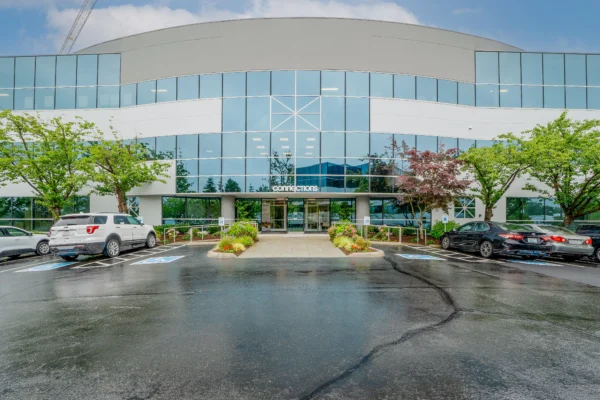The Kirkland center
There are many questions surrounding the plan to locate one of five county Crisis Care Centers at Broadway and Union. One of the biggest — who will run it? — can’t be answered yet due to county procurement policies.
A spokesperson for the King County Department of Community and Human Services tells CHS they can’t reveal if the Arizona-headquartered service provider Connections that is operating its transformed Kirkland location as the first in the planned $1.25 billion network of five facilities across the county has made a bid to also operate the planned Broadway center.
In February, the county selected Connections as its “Launch Ready” partner in a plan to purchase the $39 million Kirkland building while providing funding to operate a 24/7 mental health care facility.
In March, the county accepted requests for proposals for the second new center planned for Broadway and Union. Due to policies around its contractors, the county cannot yet say how many providers applied and if Connections is planning to expand its Puget Sound presence.
Connections has not responded to CHS’s questions about the contract.
The county had been planning to announce the results of the “request for proposals” for the “Central Crisis Response Zone” center this summer.
There is opposition to the plan from businesses, property owners, and residents as the county grapples with challenges around siting the first network center planned to be near an area of neighborhood businesses and densely populated apartment buildings.
Earlier this month, Rep. Shaun Scott and Seattle City Councilmember Alexis Mercedes Rinck threw their support behind the Broadway and Union plan and the proposed $50 million acquisition of a former Polyclinic facility at the corner.
CHS reported here on the voter-approved county levy in spring of 2023. Costing median-value homeowners an estimated $121 a year over a nine year period, the levy could raise as much as $1.25 billion through 2032 to fund creation of the five crisis care centers and increase mental health services in the county. In addition to buying and owning the properties, the levy will provide companies like Connections access to operations funding plus $2 million annually “in workforce funding to support, strengthen, and recruit their workforce.”
The Crisis Centers must provide 24/7 walk-in care, 23-Hour Observation Units for patients brought in by police “to receive immediate care to stabilize and stay for up to 23 hours,” and “crisis stabilization beds” where individuals can stay for up to 14 days “to receive focused behavioral health treatment.”
The county says that the Polyclinic site offers a number of hard-to-find advantages. It is large enough to support the Crisis Care Center, which calls for 30,000 square feet of space. It has the right zoning and is already built out for health care services.
The implementation plan splits the county into five zones. The “Central Crisis Response Zone” is hoped to be centered at Broadway and Union. The Kirkland center is part of the system’s zone serving “North King County communities.”
The Kirkland facility currently receives an estimated 28 patients per day, a total county officials say is in line with projections.
Councilmember Joy Hollingsworth who represents the area around the proposed Broadway center in her council District 3, says there are more questions that need to be answered before the plan can proceed.
Those community questions and how the county answers could make or break the plan. The county says it will need “a written demonstration of the city’s support. According to the Crisis Care Center Levy Implementation Plan, this “may include, but not be limited to, the host jurisdiction’s letter of support, memorandum of understanding, or legislation expressing support.”
Officials remain in listening — and answering — mode.
This month, the Capitol Hill Community Council provided the county with a list of questions around concerns about the planned facility including worries about East Precinct staffing levels and what will happen to the clinic’s patients after they are discharged.
“Unlike emergency rooms, before a patient is discharged from a Crisis Care Center, staff
will identify a safe place for each person to go and coordinate care with appropriate behavioral
health, medical, and social services to further support the person,” one Department of Community and Human Services response reads. “This could also include
transportation assistance to return home, to stay with a friend or family member, or to access a respite or shelter resource.”
Answers about staffing at the East Precinct and Seattle’s public safety budget are more difficult for county leaders to address.
Officials are also pointing to South Lane’s Crisis Solutions Center run by the Downtown Emergency Service Center as an example of a nearby facility that meshes with its neighborhood. In 2010, there was strong opposition to that center planned to provide mental health services to subjects referred by police. “These people are in your community tonight, except they are not getting any help,” King County Prosecutor Dan Satterberg said at the time.
There are lots more questions — and answers — you can check out the full Q&A document shared by the community council for more.
Will it be enough to help get the public process around the proposed Broadway and Union center back on track? The Department of Community and Human Services, as it also must begin the process of locating potential center sites in three other areas of the county, says it is in danger of delaying the opening of the second center in the new system until 2028 if the Broadway plan falls through.
 $5 A MONTH TO HELP KEEP CHS PAYWALL-FREE
$5 A MONTH TO HELP KEEP CHS PAYWALL-FREE
🌈🐣🌼🌷🌱🌳🌾🍀🍃🦔🐇🐝🐑🌞🌻
Subscribe to CHS to help us hire writers and photographers to cover the neighborhood. CHS is a pay what you can community news site with no required sign-in or paywall. To stay that way, we need you.
Become a subscriber to help us cover the neighborhood for $5 a month — or choose your level of support 👍




